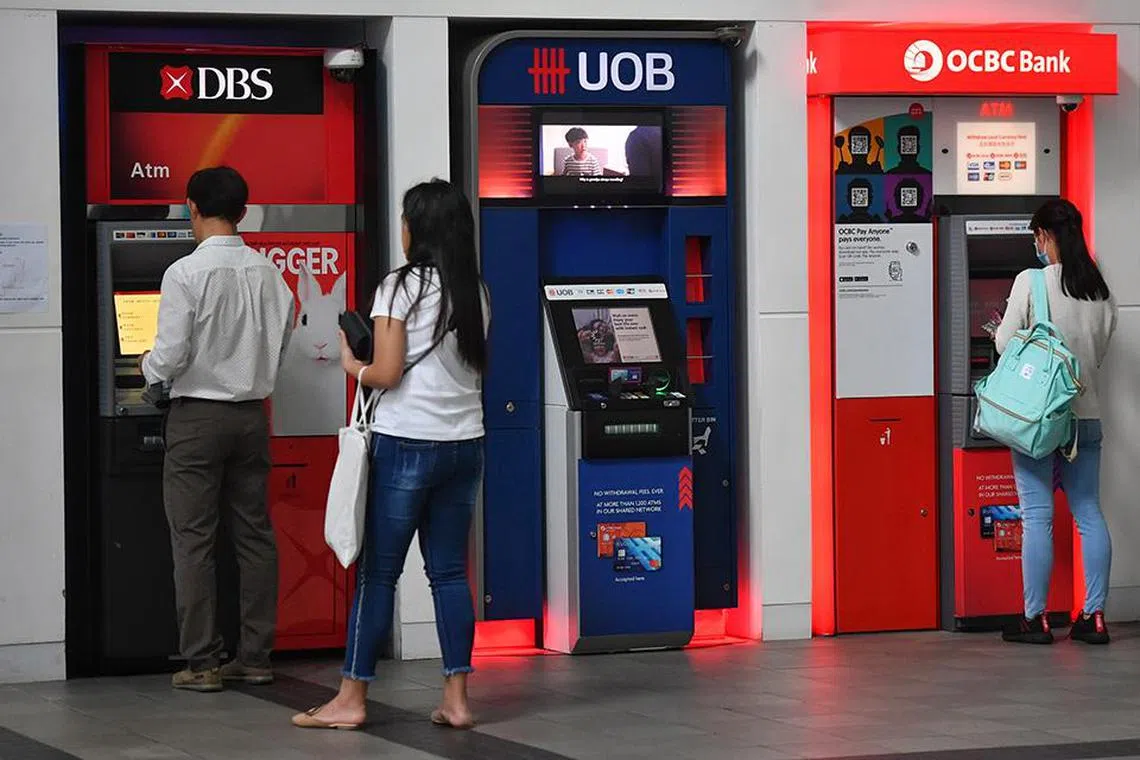S’pore bank stocks drop amid global rout on SVB collapse and rethink on interest rates
Sign up now: Get ST's newsletters delivered to your inbox

Singapore’s trio of local banks all retreated for a second day, although the declines were more modest.
PHOTO: ST FILE
Washington – Shockwaves from the collapse of Silicon Valley Bank (SVB)
Global financial stocks have lost US$465 billion (S$627 billion) in market value so far as investors cut exposure to lenders in places from New York to Singapore.
Bank stocks in Asia fell again on Tuesday. At market close, big Australian banks ANZ and NAB had lost 1.5 per cent and 1.54 per cent respectively, with Westpac down by 0.37 per cent. Japan’s TOPIX bank index fell 7.41 per cent.
Singapore’s Big Three local banks fell for a second day, although more modestly. At the close of trading, DBS Bank was down 1.13 per cent to $32.33, OCBC Bank had slipped 0.74 per cent to $12.07 and UOB had lost 1.59 per cent to $27.84.
The Straits Times Index was down 1 per cent after sliding 1.4 per cent on Monday. It was down by 0.08 per cent after markets closed on Tuesday.
The Monetary Authority of Singapore (MAS) said on Monday
Mr Biden’s bid to reassure markets and depositors
Meanwhile, a furious race to reprice interest rate expectations has sent waves through markets as investors bet that the Federal Reserve would be reluctant to hike rates next week.
“Even if the collapse of several mid-tier banks does not develop into a full-blown systemic crisis, it will more than likely trigger a credit crunch,” said Dr Paul Ashworth, chief North America economist at Capital Economics.
Traders see a 50 per cent chance of no rate hike at that meeting, with rate cuts priced in for the second half of the year. Early last week, a 25 basis-point hike was fully priced in, with a 70 per cent chance seen of 50 basis points.
With investors fearing more failures, major US banks lost around US$90 billion in stock value on Monday, bringing their loss over the past three trading sessions to nearly US$190 billion.
Regional US banks were the hardest hit. Shares of First Republic Bank tumbled more than 60 per cent as news of fresh financing failed to reassure investors, and so did Western Alliance Bancorp and PacWest Bancorp.
At 5.40pm Singapore time, Europe’s Stoxx banking index was down by 0.59 per cent. Germany’s Commerzbank was up by 0.08 per cent and Credit Suisse slid 5.23 per cent.
Fallout
In the money markets, indicators of credit risk in the US and euro zone banking systems edged up.
Emboldened by bets that the Fed may have to slow its rate hikes, the price of gold, a popular safe-haven asset, raced above the key US$1,900 level.
Companies worldwide with SVB accounts rushed to assess the impact on their finances. In Germany, the central bank convened its crisis team to assess any fallout.
After marathon weekend talks, HSBC said it was buying the British arm of SVB for a symbolic £1 (S$1.60). While SVB UK is small, its sudden demise prompted calls for government help for Britain’s start-up industry, and its heavily exposed biotech sector in particular.
British Prime Minister Rishi Sunak said there is no concern about systemic risk. “Our banks are well capitalised, the liquidity is strong,” he told ITV during a visit to the US.
In China, where SVB was the main go-to foreign bank for the majority of start-ups, entrepreneurs and venture funds were also scrambling for alternative funding. REUTERS, BLOOMBERG
With additional information from The Straits Times


